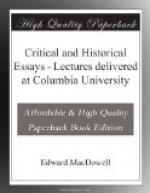To return to the French composers. Herold was born in 1791, in Paris, and his principal works were “Zampa” and the “Pre aux clercs.” The first was produced in 1831, the latter in 1832. He died in 1833. Boieldieu was born in 1775, in Rouen; died 1834. His principal works were “La dame blanche” and “Jean de Paris.”
Halevy (Levy) was born in 1799, in Paris, and died in 1862; his father was a Bavarian and his mother from Lorraine. He wrote innumerable operas. His most famous work, “La juive,” written in 1835, was killed by Meyerbeer’s “Huguenots,” and produced a year later. He was professor of counterpoint at the Conservatoire from 1831, among his pupils being Gounod, Masse, Bazin, and Bizet.
Auber was born in 1782, and died in May, 1871. He was practically the last of the essentially French composers. His operas may be summed up as being the perfect translation into music of the witty plays of Scribe, with whom he was associated all his life. To read a comedy by Scribe is to imagine Auber’s music to it. No one has excelled Auber in the expression of all the finesse of wit and lightness of touch. What the union between the two men was may be inferred from the fact that Scribe wrote many of his librettos to Auber’s music, the latter being written first, Scribe then adding the words. His principal works are “Masaniello” or “The Mute,” and “Fra Diavolo.” He was appointed director of the Paris Conservatoire, in 1842, in succession to Cherubini.
In speaking of Gretry, I quoted his opinion (given in one of his essays on music) as to what opera should be and cited his use of the leitmotiv in his “Richard Coeur de Lion” (which contains the air, une fievre brulante). If with this we quote his reasons for writing opera comique rather than grand opera, we have one of the reasons why French opera has, as yet, never developed beyond Massenet’s “Roi de Lahore” on one side, and Delibes’ “Lakme” on the other.
Gretry writes that he introduced lyric comedy on the stage because the public was tired of tragedy, and because he had heard so many lovers of dancing complain that their favourite art played only a subordinate role in grand opera. Also the public loved to hear short songs; therefore he introduced many such into his operas.
Even nowadays, this seeming contradiction between theory and practice is to be found, I think, in the French successors of Meyerbeer. The public needed dancing, and all theories must bend to that wish. Even Wagner succumbed to this influence in Paris; and when Weber’s “Freischuetz” was first given at the grand opera, Berlioz was commissioned to arrange ballet music from Weber’s piano works to supply the deficiency.
In France, even to-day, everything gives way to the public, a public whose intelligence from a poetic standpoint is, in my opinion, lower than that of any other country. The French composer is dependent on his country (Paris) as is no musician of other nationality. Berlioz’ life was embittered by the want of recognition in Paris. Although he had been acclaimed as a great musician all over Europe, yet he returned again and again to Paris, preferring (as he admits) the approbation of its musically worthless public to his otherwise world-wide fame.




